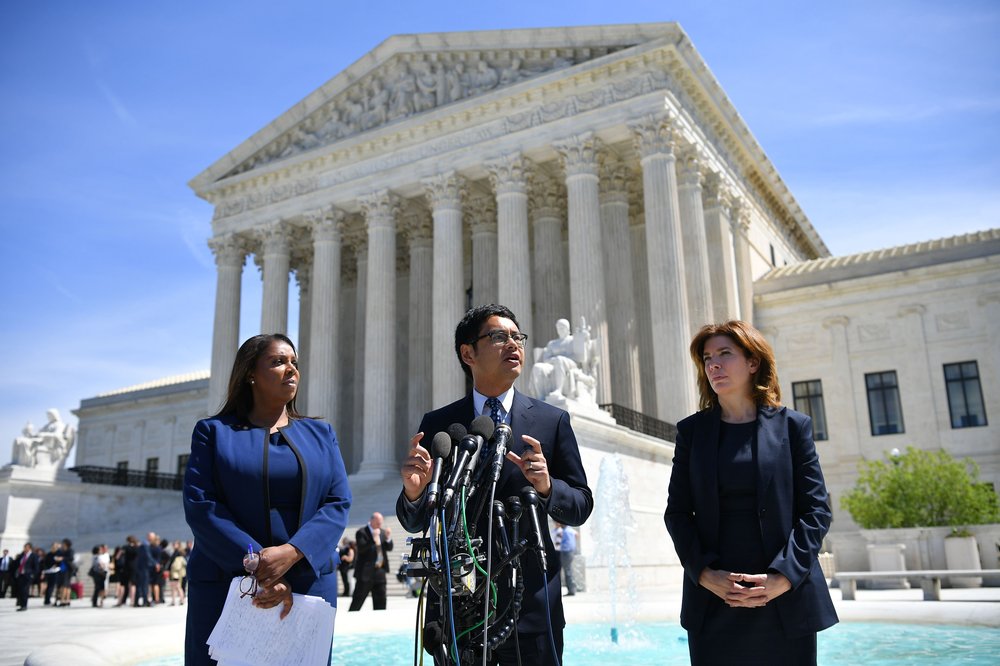A look inside the decision that ended the criminal case against NYC Mayor Eric Adams
April 2, 2025, 5:37 p.m.
In a 78-page decision, United States District Judge Dale Ho said he’s dismissing the mayor’s case with no chance of bringing it back.

A federal judge ended New York City Mayor Eric Adams’ legal saga with a scathing ruling Wednesday, with the judge suggesting that the Department of Justice could be using Adams’ case to advance President Donald Trump’s immigration agenda.
Adams pleaded not guilty in September to charges that he accepted flight upgrades, lavish hotel accommodations and illegal campaign donations in exchange for political favors. Then, after Trump took office, his appointees in the DOJ directed New York prosecutors to stop pursuing the case — at least until after the mayoral election. They argued in part that it was impeding Adams’ ability to focus on immigration enforcement. The acting U.S. attorney for the Southern District of New York said the mayor’s attorneys had been pushing for a quid pro quo with the Trump administration and resigned in protest, followed by several other prosecutors.
In a 78-page decision, U.S. District Judge Dale Ho said he’s dismissing the mayor’s case with no chance of bringing it back, so Adams won’t be “beholden” to the federal government’s demands.
“Such an arrangement would be bad for Mayor Adams, and it would be bad for the people of New York City,” Ho wrote. “And the court cannot be complicit in it.”
Here are the highlights from Ho’s ruling:
Judge Ho has serious concerns about the DOJ’s motives
When DOJ officials asked Ho to dismiss the mayor’s charges in February, they argued that the case would interfere with his ability to govern New York City, posing a threat to public safety and federal immigration initiatives.
Ho called this justification “unprecedented and breathtaking in its sweep.”
He noted that the mayor’s lawyer sent a letter to DOJ officials outlining various ways the mayor could help with immigration enforcement. Then, just days after the DOJ directed prosecutors in New York City to dismiss his case, Adams took one of the steps he outlined in the letter. On Feb. 13, he announced plans to issue an executive order allowing ICE to operate on Rikers Island.
The judge said Adams’ Rikers decision showed the case was not getting in the way of his ability to help with immigration enforcement.
“Instead, it shows that after [the DOJ] decided to seek dismissal of his case, the mayor took at least one new immigration-related action consistent with the preferences of the new administration,” Ho wrote. “Everything here smacks of a bargain: dismissal of the indictment in exchange for immigration policy concessions.”
Ho said he didn’t determine whether there was an “explicit bargain” to drop Adams’ charge. But if there was a quid pro quo, he wrote, it would amount to “egregious” prosecutorial misconduct.
Ho said there’s no evidence that the prosecutors who brought the case broke any rules
The DOJ also told Judge Ho that he should dismiss Adams’ case because of “appearances of impropriety.” It argued that, under the prior administration, prosecutors brought the indictment too close to the 2025 mayoral election.
But Ho said neither Adams nor the DOJ pointed to any rules that bar prosecutors from charging a politician nine months before an election, as in this case.
“It is also difficult to imagine how such a rule could work in practice without effectively gutting public corruption laws,” he wrote, because elections happen so often.
Ho also said there's no evidence that Damian Williams, the former U.S. attorney who brought the case, acted improperly when he wrote an op-ed about corruption in politics.
Ho said he carefully read the op-ed and found that it largely focused on state politics, not city. One line that said New York City was being “led with a broken moral compass” could be referring to Adams, he said, but didn’t violate court rules. The judge noted that the investigation started before Williams took office and continued after he left.
Ho said the DOJ’s arguments about perceived impropriety were likely a “distraction” from the real reasons officials wanted to dismiss the case.
“There is no evidence — zero — that they had any improper motives,” he wrote.
The judge said the dismissal is “not a perfect solution”
Ho made clear in his ruling that he’s not weighing in on whether Adams is innocent or guilty. He also declined to conduct a more thorough investigation into whether the mayor agreed to help the Trump administration so his charges would be dropped — an allegation that the mayor's attorneys and Trump administration officials have both denied.
“Some will undoubtedly find today’s decision unsatisfying,” Ho wrote.
But the judge said his powers are limited in cases like this, where prosecutors have asked a court to dismiss criminal charges. He said his job is to oversee cases, not to decide whether they should move forward. And he said he can’t force the DOJ to pursue the case.
“It is precisely in the most difficult cases that it is most critical to adhere to constitutional principles,” Ho wrote. “That includes recognizing the limits of this court’s constitutional authority consistent with the separation of powers. “
Ho said he does have the authority in one way to go against the DOJ’s wishes: by dismissing the charges with prejudice, meaning that they couldn’t be revived later on. The Trump administration wanted Ho to drop the case without prejudice, which would have allowed federal prosecutors to bring back the indictment “at essentially any time, and for essentially any reason,” the judge wrote.
Ho said leaving open the possibility of a later trial could amount to “prosecutorial harassment” against the mayor.
Judge permanently dismisses corruption charges against Mayor Adams Celebrating dropped charges, Mayor Adams promotes Trump FBI director Kash Patel’s book